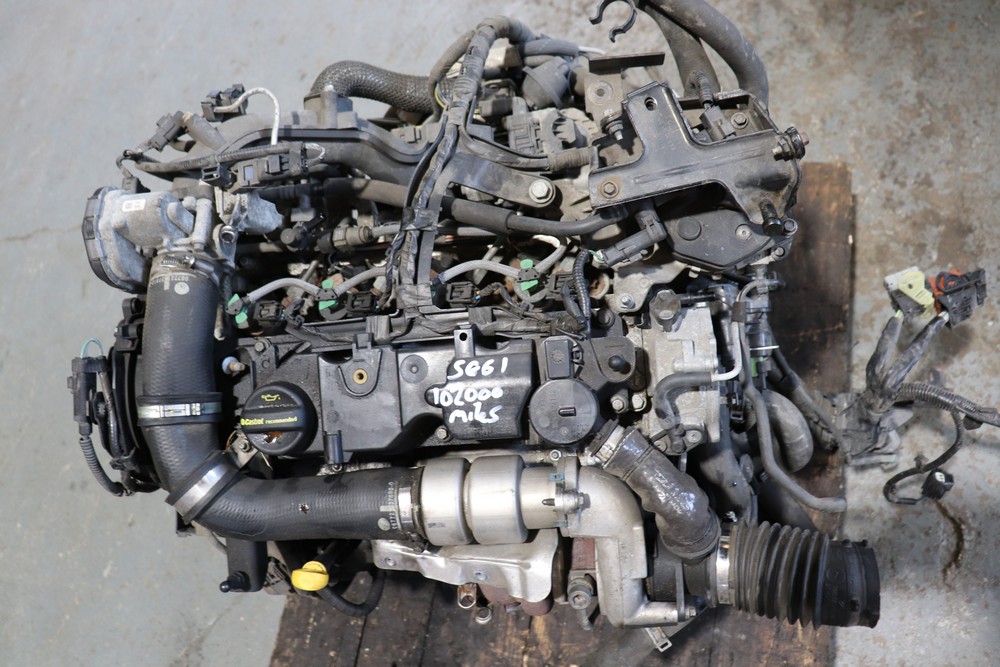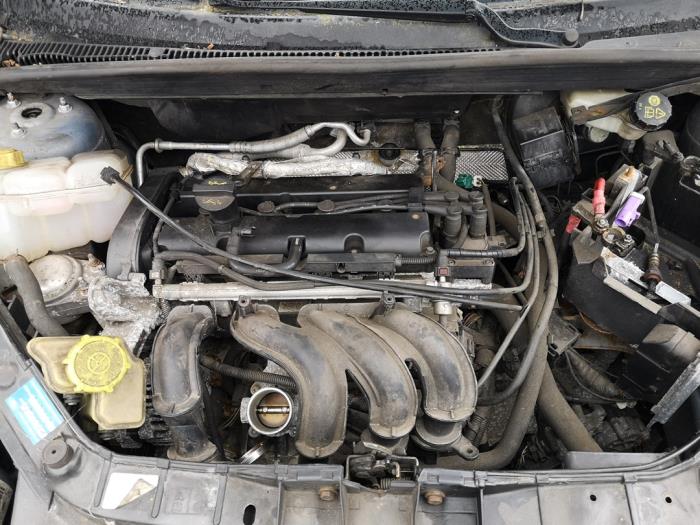Common Issues with the Ford Fiesta Engine and How to Fix Them
Wiki Article
The Future of Engines: Advancements Driving Lasting Power Solutions
As the vehicle market navigates the important transition in the direction of sustainability, the future of engines is progressively specified by groundbreaking innovations. Electric engine advancements, along with encouraging advancements in hydrogen gas cells and biofuels, are reshaping the landscape of power solutions. The appearance of hybrid systems even more complicates this development, presenting both challenges and possibilities to lower emissions properly. Combined with the assimilation of expert system in engine design, these technological strides increase vital concerns concerning their long-lasting practicality and effect on typical standards. What might this suggest for the sector and consumers alike?Electric Engine Advancement
The evolution of electrical engine advancements signifies a crucial shift in the vehicle and aerospace markets, driven by the urgent need for sustainable alternatives to nonrenewable fuel sources. This shift is defined by substantial developments in battery innovation, power electronic devices, and electric motor style, which jointly enhance the effectiveness and performance of electrical engines.Recent technologies have resulted in the development of lighter, a lot more energy-dense batteries, such as lithium-silicon and solid-state batteries, which promise longer arrays and shorter billing times. Additionally, renovations in electrical motor efficiency, such as the use of permanent magnets and advanced cooling down systems, allow electrical engines to operate successfully under differing conditions. These improvements not only boost vehicle efficiency yet additionally contribute to a reduction in overall energy consumption.
Moreover, the integration of innovative software algorithms has optimized energy management in electric lorries, enabling regenerative braking and predictive billing approaches. As makers progressively welcome electrical propulsion, the aerospace and auto markets are observing a paradigm change in the direction of greener modern technologies. This development not only satisfies regulatory demands yet also lines up with customer choices for eco friendly transportation solutions, solidifying electrical engines as a foundation of future sustainable mobility.
Innovations in Biofuels
As the aerospace and automotive sectors progressively focus on sustainable energy resources, advancements in biofuels arise as a corresponding service to electric engines. Biofuels, obtained from natural materials such as crops, waste, and algae, offer a cutting-edge avenue for reducing greenhouse gas exhausts and dependence on nonrenewable fuel sources.Current research study has focused on boosting the efficiency and sustainability of biofuel manufacturing. Second-generation biofuels make use of non-food feedstocks, decreasing competitors with food supply and reducing environmental influence. Innovations in synthetic biology have actually enabled the engineering of microorganisms to generate biofuels a lot more successfully, leading to higher yields and lower production costs.
Furthermore, the advancement of drop-in biofuels enables seamless assimilation right into existing framework, allowing a smoother change for sectors typically dependent on nonrenewable fuel sources. ford fiesta engine. These fuels can be used in existing engines without modifications, promoting their adoption across numerous industries
Investments in biofuel modern technology, together with helpful policies, are essential to drive innovation and scalability. As the international neighborhood looks for to deal with climate adjustment, biofuels use a practical, immediate service that straightens with the overarching goal of sustainability in transport and air travel.
Hydrogen Fuel Cell Modern Technology
A growing number of companies and researchers are discovering hydrogen gas cell technology as a sensible alternative to standard source of power in transport and power systems. This technology converts chemical energy from hydrogen right into electrical power with an electrochemical response, with water as the only by-product, making it an eco-friendly option.The core of hydrogen gas cells is the gas cell pile, where hydrogen particles are divided right into protons and electrons. The circulation of electrons generates power, while protons relocate with a membrane to combine with oxygen from the air, creating water. This process leads to high performance and reduced exhausts, placing hydrogen fuel cells as a crucial gamer in the shift to sustainable energy.
Significant innovations have actually been made in boosting the sturdiness and performance of fuel cells, alongside reducing expenses through ingenious manufacturing methods. The development of hydrogen manufacturing techniques, such as electrolysis powered by eco-friendly power resources, boosts the sustainability of the total system. As infrastructure for hydrogen refueling expands and production approaches become much more effective, hydrogen fuel cell technology holds excellent pledge for decarbonizing various industries, including sturdy transportation and fixed power generation.
Hybrid Equipments and Their Impact
Hybrid systems stand for a substantial advancement in lasting engine technology, merging conventional inner burning engines with electric propulsion to maximize power efficiency and minimize exhausts (ford fiesta engine). This dual strategy permits vehicles to make use of both power sources, making it possible for higher flexibility in energy additional hints consumption and lowering reliance on fossil gas

In addition to ecological benefits, crossbreed systems offer consumers a practical shift in the direction of completely electrical automobiles. They relieve range stress and anxiety by integrating the ease of gas with the advantages of electric propulsion, making them an attractive choice for a larger target market. As manufacturers buy hybrid innovation, the growth of advanced battery systems and light-weight products remains to boost efficiency. Overall, crossbreed systems represent an essential action towards attaining sustainable transportation and dealing with the urgent demand for eco-friendly power options.
The Function of AI in Engine Style
Leveraging advanced formulas and artificial intelligence strategies, the automotive market is progressively integrating fabricated intelligence (AI) into engine design processes. AI boosts the efficiency and efficiency of layout by examining large datasets to recognize optimum configurations and efficiency parameters. This capability enables designers to simulate numerous operating problems and forecast engine behavior under numerous situations, dramatically decreasing the moment and cost connected with conventional prototyping techniques.Additionally, AI helps with the growth of advanced materials and burning procedures tailored for sustainability. By optimizing fuel effectiveness and decreasing emissions, AI-driven styles straighten with global efforts targeted at lowering the carbon impact of auto engines. Artificial intelligence formulas can also navigate to these guys forecast maintenance requirements, resulting in improved reliability and long life of engine parts.
In Addition, AI is crucial in the assimilation of electrification modern technologies, such as hybrid systems, where it can maximize battery management and energy recuperation processes. As the sector moves in the direction of even more lasting power options, the role of AI in engine design becomes increasingly crucial, driving advancement and enhancing the performance of future engines. Ultimately, the partnership in between AI and engine design heralds a brand-new period of smarter, cleaner, and extra efficient auto technologies.

Final Thought
In verdict, the future of engines is being shaped by a merging of ingenious innovations that prioritize sustainability. Electric engine developments, biofuel advancements, hydrogen fuel cells, and hybrid systems jointly add to a significant decrease in exhausts and environmental influence.Electric engine innovations, together with appealing developments in hydrogen fuel cells and biofuels, are reshaping the landscape of power solutions. Furthermore, improvements in electrical motor effectiveness, such as the use anchor of permanent magnets and progressed cooling systems, enable electrical engines to operate efficiently under varying conditions. By enhancing gas performance and decreasing discharges, AI-driven designs straighten with international campaigns aimed at minimizing the carbon footprint of vehicle engines. As the industry moves towards even more lasting power remedies, the role of AI in engine layout ends up being progressively vital, driving development and improving the efficiency of future engines. Electric engine improvements, biofuel developments, hydrogen gas cells, and crossbreed systems jointly contribute to a significant decrease in discharges and environmental impact.
Report this wiki page